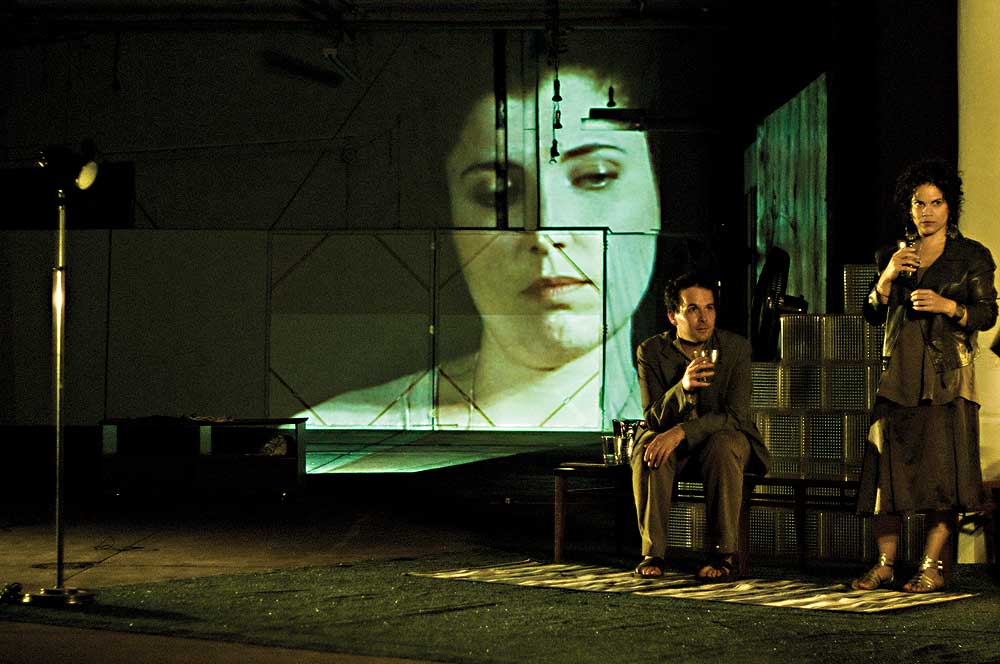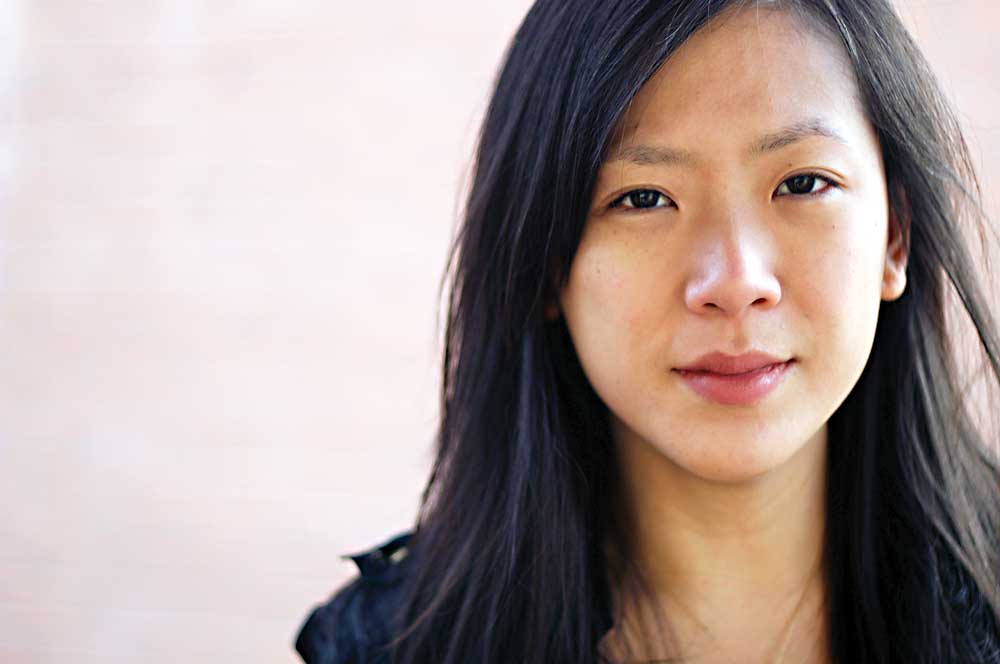Meiyin Wang is jet-lagged. She’s just returned from an all-too-brief trip to Taiwan to see family and now sits at her desk at New York City’s Public Theater, where she is associate artistic producer of the Under the Radar festival. Dressed in chic presenter black, she’d be more bleary-eyed if it weren’t for the chocolate-covered espresso beans she occasionally munches on. Mark Russell, the Public’s director of the Devised Theater Initiative and UTR, isn’t in at the moment. The office they share, along with a rotating cast of interns, is remarkably pint-sized, considering the impact Under the Radar has had on U.S. theatre in the past nine years.
“We’ve been talking about what the next challenge and phase of Under the Radar will be,” says Wang, between espresso bean crunches and automated beeps from her computer that alert her to incoming e-mails. “When Mark began UTR, he was looking at how ensembles like the Wooster Group weren’t playing at regional theatres and asking, ‘How can we get regional theatres with resources and audiences to team up with boundary-pushing ensembles?’ Part of that dynamic was touring, because that’s a way that ensembles survive. And now—almost 10 years later—these questions are part of the national conversation.” She betrays a note of pride as she casually pops another bean into her mouth before adding, “So now the question is, what’s the next big question?”
Inevitably, Wang will help shape that question. She has been Russell’s protégée since 2006 and will helm both the New York office and the Devised Theater Initiative once Russell takes up residence later this month in Switzerland, from where he’ll continue to curate UTR. Wang is unfazed by the changes ahead, and understanding her background as someone who navigates among nationalities and artistic identities is crucial to comprehending this unfussy fearlessness.
“I would like to go on record that I am not a U.S. citizen,” she deadpans. (At press time, a Wikipedia entry still referred to her as an “American director.”) Wang grew up in Singapore and has lived off and on in the U.S. since her undergraduate days at Yale. After a year-long stint at Singapore Repertory Theatre, where she was a playwright-in-residence, Wang came back to the States to pursue an M.F.A. in directing at Columbia. There, under the mentorship of Anne Bogart, Brian Kulick and Robert Woodruff, Wang steeped herself in what she calls “deconstructed classics.” Working at UTR provided another kind of education.
In her first year at the festival, Wang worked part-time while juggling her career as a director. Meanwhile, she caught up on ensemble-created theatre. “I was cataloguing videos of everything that came in,” she says, bounding out of her chair to show me an enormous hallway filing cabinet full of DVDs and press packets. She looks back on the Sisyphean task with a smile, and now tells interns charged with the maintenance, “You think you don’t want to catalogue, but trust me, you’ll want to know all the names of groups, countries they’re from and context of their work.” Back in her office she adds, “We don’t really read letters of introduction in the media packets. We just watch the DVDs. The proof is in the grainy video.”
Her UTR master’s degree, so to speak, led Wang away from the deconstructed classics she’d become skilled at making while at Columbia, and for a while she stopped directing altogether. “I felt like I didn’t have anything I had to say—and that’s what art should be,” Wang emphasizes. “It’s useless to do something if you don’t have something to say about it. If there’s no primal need to make a piece, then I’d like to concentrate on my job and see as much as I can.”
Recently that’s changed, though. She was awarded a MAP Fund grant last year and a Berkeley Repertory Theatre Ground Floor residency for a project she’s been developing with director and soon-to-be-husband Eric Ting, associate artistic director of Connecticut’s Long Wharf Theatre. At the Museum of Chinese in America in 2011, I caught an early version of motherland/foreign relations (we all here why you never call)?, in which Wang takes on the last 100 years of Chinese history as told through New York Times headlines. But that’s not all: There are video interviews between Wang and her mother about mère Wang’s personal history; dumplings are cooked by performers (and consumed by the audience); and live interviews are conducted in Chinese between Wang and women of her mother’s age and live-translated via Google.
“It’s a passion project with huge questions that I have no answers to—no answers!” Wang exclaims, describing how the piece ultimately examines the filters of history via electronic transmission and translation. Ting and Wang, who plan to marry this month, will go to China to further develop the piece.
“I live in New York City, but I haven’t seen a lot of contemporary performance about what it is to be a global citizen of Asian-Chinese decent,” Wang observes. “Probably that’s because all the good Chinese people are busy being doctors.” She pauses before adding, with the self-aware verve of a comedian who traffics in stereotypes, “By the way, I’m not good at math.”

Wang’s affinity for documentary theatre is reflected not only in her work as a theatremaker but also in her programming interests at UTR. “A lot of theatre is insular, and that can be beautiful in its own way, and interesting for those on the inside. But how do you tell a story that’s larger? A story about how to be a citizen in the world?” An example of the latter is Silver Stars, which Wang saw at the Dublin Theatre Festival some years ago. The play brought real-life stories of gay Irish men to the stage at the same time the question of gay marriage was buzzing around New York, and Wang moved swiftly to get the production into UTR’s programming. Looking ahead, Wang is excited about Argentinean director Lola Arias, whose docu-theatre piece El año en que nací, about children born in the aftermath of the Pinochet dictatorship, she encountered on a trip to Chile. “My interest is always: How do you use theatre to tell a true story? Did you know I was a double major in theatre and political science?”
“Meiyin’s naturally international perspective on the field is crucial as the world of theatre becomes more global,” says her partner Russell. “Our connection is deep and powerful, and it will change and evolve over the next few years. I would trust no one else to go on that journey with me.” Indeed, the duo’s work relationship goes beyond sharing a tiny office—Russell’s name was listed as a sponsor in Wang’s passport for a number of years while she was on an O-1 visa, and Russell admits that Meiyin has introduced him to “many strange foods, several out-of-the-way performance spaces, late hours, and levels of intoxication that are not recommended for those over 50 years old.”
“It’ll work like gangbusters,” says Wang of the impending structural changes in UTR and the plan for Russell to reside in Europe. Wang will continue to travel as well, and admits to having a natural affinity for planes. “I love being on them—there’s a weird limbic space that opens up when you’re between time zones, between countries and worlds, and there’s something that opens up in your brain. I think of it as a metaphor for being an expatriate. When you’re on a plane, you literally have to look at something from a different angle. That’s something I’m trying to cultivate in myself.”
“The direction Meiyin will take the festival is actually up to the field,” says Russell. “We can only be as adventurous and inventive as the artists we present.” To that end, Russell believes Wang will bring more American voices to the UTR platform in service of international exchange: “Her understanding of the international theatre scene will keep American artists from being too parochial and place them on equal footing with the most adventurous artists from around the world.”
As our interview concludes, I take a spin as devil’s advocate. What about the need for locally grown theatre? Why have an international festival at all, when there is such a rich tapestry of artistic offerings on American soil? There’s something going on in U.S. culture that’s “a bit like inbreeding,” Wang responds. “This kind of internal feedback loop is actually happening in our daily lives in terms of whatever Facebook update or Google news search we want to see. There is something so dangerous about that.” An international festival alleviates that danger “by introducing another point of view or aesthetic. You can jar something open. You get closer to creating that limbic space. You can’t eat Raisin Bran every day. You gotta have your rice porridge or congee.”


